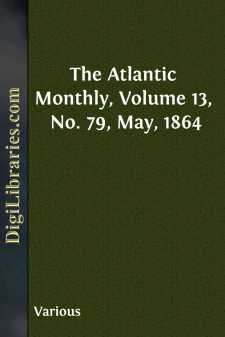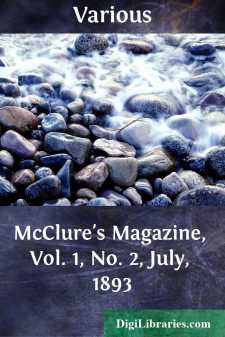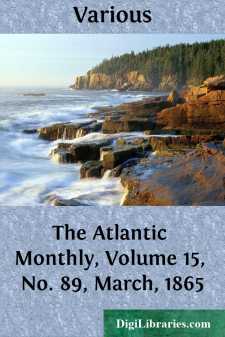Periodicals
- Art 27
- Children's periodicals 59
- Entertainment 5
- Food/Wine 2
- Games/Humor 455
- General
- Health 1
- History 53
- House/Home 1
- Regional 62
- Science/Nature 118
- Transportation 10
General Books
Sort by:
by:
Various
A CRUISE ON LAKE LADOGA. "Dear Q.,—The steamboat Valamo is advertised to leave on Tuesday, the 26th, (July 8th, New Style,) for Serdopol, at the very head of Lake Ladoga, stopping on the way at Schlüsselburg, Konewitz Island, Kexholm, and the island and monastery of Valaam. The anniversary of Saints Sergius and Herrmann, miracle-workers, will be celebrated at the last-named place on Thursday,...
more...
by:
Various
WILLIAM GASTON. By ARTHUR P. DODGE. Victor Hugo has written: "The historian of morals and ideas has a mission no less austere than that of the historian of events. The latter has the surface of civilization, the struggles of the crowns, the births of princes, the marriages of Kings, the battles, the assemblies, the great public men, the revolutions in the sunlight, all exterior; the other historian...
more...
by:
Charles Peters
CHAPTER I.THE VALLEY OF HUMILIATION. erle, I may be a little old-fashioned in my notions; middle-aged people never adjust their ideas quite in harmony with you young folk, but in my day we never paused to count fifty at a full stop." Aunt Agatha's voice startled me with its reproachful irritability. Well, I had deserved that little sarcasm for I must confess that I had been reading very...
more...
by:
Various
Loch Goil Head AND RESIDENCE OF CAMPBELL, THE POET. The Engraving represents Loch Goil Head, a small village in Argyleshire, as it name imports, at the end of Loch Goil. It is an exquisite vignette, of Alpine sublimity, and is rendered extremely interesting as the residence of Thomas Campbell, Esq. author of the "Pleasures of Hope," &c. and one of the most celebrated of British poets. His...
more...
by:
Various
THE HOME OF LAFAYETTE. After General Lafayette's visit to the United States, in 1824, every American who went to France went with a firm conviction that he had a right to take as much as he chose of the old gentleman's time and hospitality, at his own estimate of their value. Fortunately, the number of travellers was not great in those days, although a week seldom passed without bringing two...
more...
by:
Various
GEORGE DEXTER ROBINSON. BY FRED. W. WEBBER, A.M. [Assistant Editor of the Boston Journal.] His Excellency George D. Robinson, at present the foremost citizen of Massachusetts, by reason of his incumbency of the highest office in the Commonwealth, is the thirtieth in the line of succession of the men who have held the office of Governor under the Constitution. In character, in ability, in education, and...
more...
by:
Various
FOLK LORE IN THE REIGN OF KING JAMES I. In turning over the pages of an old book of controversial divinity, I stumbled upon the following illustrations of folk lore; which, as well from their antiquity as from their intrinsic curiosity, seem worthy of a place in your columns. They make us acquainted with some of the usages of our ancestors, who lived in the remoter districts of England early in the...
more...
by:
Various
But I had known all about him before that. As little boys, we had by heart, in those days, the song which saved “Old Ironsides” from destruction. That was the pet name of the frigate “Constitution,” which was a pet Boston ship, because she had been built at a Boston shipyard, had been sailed with Yankee crews, and, more than once, had brought her prizes into Boston Harbor. We used to spout at...
more...
by:
Various
My story begins as a great many stories have begun within the last three years, and indeed as a great many have ended; for, when the hero is despatched, does not the romance come to a stop? In early May, two years ago, a young couple I wot of strolled homeward from an evening walk, a long ramble among the peaceful hills which inclosed their rustic home. Into these peaceful hills the young man had...
more...
by:
Various
ZOOLOGICAL GARDENS, REGENT'S PARK. THE POLAR BEAR. MONKEY CAGE. A visit to these Gardens is one of the most delightful of the rational recreations of the metropolis. The walk out is pleasant enough: though there is little rural beauty on the road, the creations of art assume a more agreeable appearance than in the city itself; and, with cottages, park-like grounds, and flourishing wood, the eye...
more...











